Just In
- 2 hrs ago

- 3 hrs ago

- 4 hrs ago

- 12 hrs ago

Don't Miss
- Finance
 1:2 Stock Split, Dividend 100%, Net Soars 52.56%: Engineering Stock Soars 1576% In 3-Yrs
1:2 Stock Split, Dividend 100%, Net Soars 52.56%: Engineering Stock Soars 1576% In 3-Yrs - News
 Protests Erupt After 24-Year-Old Neha's Murder In BVB College Campus In Hubballi
Protests Erupt After 24-Year-Old Neha's Murder In BVB College Campus In Hubballi - Sports
 WWE Raw: Battle Royal announced to determine new Women’s World Champion
WWE Raw: Battle Royal announced to determine new Women’s World Champion - Movies
 Metro In Dino: When Ananya Panday Warns Sara Ali Khan Not To Touch Aditya Roy Kapur As She Pairs Up With Him
Metro In Dino: When Ananya Panday Warns Sara Ali Khan Not To Touch Aditya Roy Kapur As She Pairs Up With Him - Technology
 Garena Free Fire Max Redeem Codes for April 20, 2024: Get Access to the Latest In-game Loot
Garena Free Fire Max Redeem Codes for April 20, 2024: Get Access to the Latest In-game Loot - Automobiles
 Ford Mustang 60th Anniversary Package – Limited To Just 1,965 Units
Ford Mustang 60th Anniversary Package – Limited To Just 1,965 Units - Education
 Exam Pressure Does Not Exist; Studying Punctually is Crucial; Says Aditi, the PSEB 2024 Topper
Exam Pressure Does Not Exist; Studying Punctually is Crucial; Says Aditi, the PSEB 2024 Topper - Travel
 Journey From Delhi To Ooty: Top Transport Options And Attractions
Journey From Delhi To Ooty: Top Transport Options And Attractions
Fantastic Health Benefits Of Opuntia (Prickly Pears), Nutrition, Uses & Caution
Opuntia also called prickly pear belongs to the cactus family, Cactaceae. Opuntia is, in fact, the scientific name of the plant and the pears are the fruits. It is also known by the name cactus fruit. There are more than 200 different species of Opuntia, out of which only a few varieties are edible. That's right, you can eat the prickly pears! Out of the vast varieties of the cactus plant, the most common one is the Indian Fig Opuntia[1] .
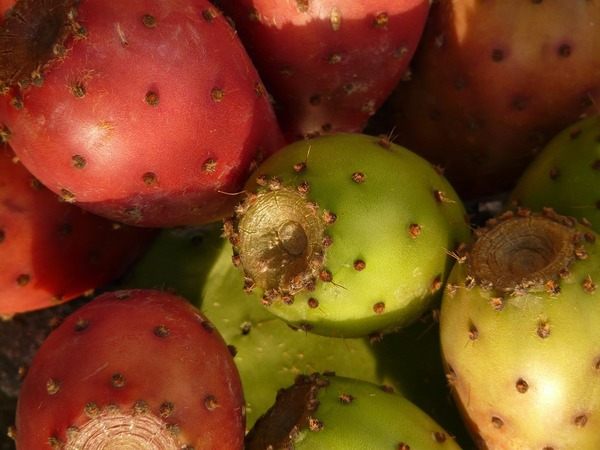
Prickly pears grow at the edge of the leaves and are covered in thorns, owing to its name. Colour of the fruit can range from yellow and light green to orange, pink, and red. Packed with various health benefits, opuntia can help lower high cholesterol levels, improve the digestive process, and decrease the risk of diabetes[2] .
Continue reading to know more about the fascinating health benefits of Opuntia.
Nutritional Value Of Opuntia
100 grams of prickly pears contain 41 calories of energy, 0.5 g fat, 0.7 g protein, 0.1 mg riboflavin, 0.5 mg niacin, 0.1 mg vitamin B6, 0.3 mg iron and 0.1 mg zinc [3] .
The remaining nutrients in opuntia are as follows:
- 9.6 g carbohydrates
- 3.6 g dietary fibre
- 88 g water
- 25 mcg vitamin A equiv.
- 6 mcg folate
- 14 mg vitamin C
- 56 mg of calcium
- 85 mg magnesium
- 24 mg phosphorus
- 220 mg potassium
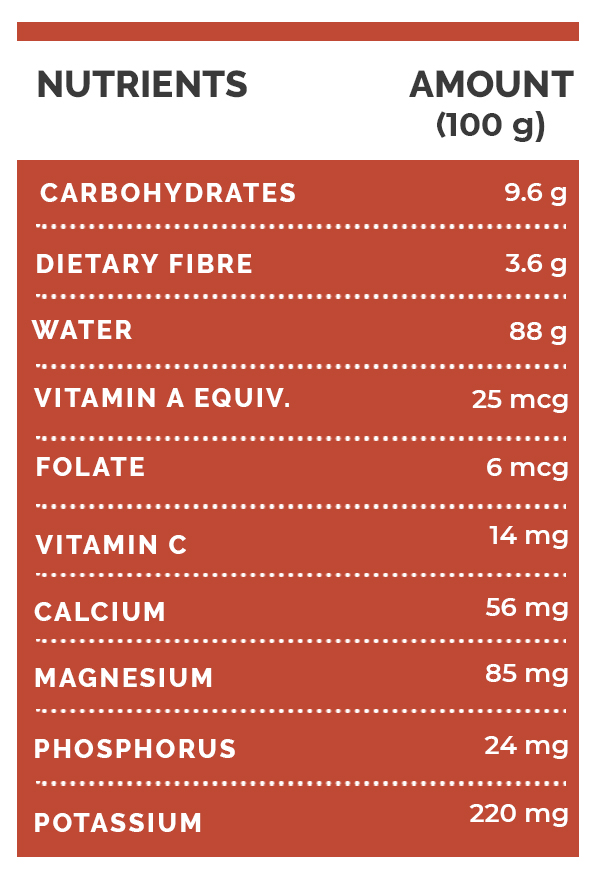
Uses Of Opuntia
Some of the most common uses of cactus fruit are mentioned below [4] .
- Used for making jellies and jams, candies or alcoholic beverages like vodka.
- Used for making colonche.
- An effective hangover cure.
Health Benefits Of Opuntia
Rich in various nutrients, vitamins and minerals, prickly pears can help improve your health in various ways [5] [6] [7] .
1. Boosts immunity
The high levels of vitamin C in opuntia aids in toxin removal. Likewise, the antioxidant property of the fruits helps boost the immune system and stimulate the production of white blood cells. It helps protect your body against various infections and eliminates the infectious microorganisms from your body. The vitamin C content also helps get rid of the free radicals from your body, giving a boost to your immune system.
2. Improves digestion
The dietary fibre content in opuntia plays a significant role in regulating your digestive process. The fibre helps by aiding the movement of food through the digestive tract and prevent the possibilities of constipation, bloating, and gastrointestinal issues such as gastric ulcers
3. Strengthens bones and teeth
Calcium content in opuntia help improves the strength of your bones and teeth. It plays a major role in the development of bone tissue and thereby acting as an efficient supplier of required calcium to your body. This help prevents age-related bone disorders like osteoporosis and dental issues.

4. Protects heart health
Packed with dietary fibre, potassium and betalain - prickly pears help improve your heart health. That is, the fibre content helps lower the levels of LDL (bad) cholesterol in the body. Potassium helps by lowering blood pressure, relaxing the blood vessels and reducing stress on the cardiovascular system. Along with that, the betalains strengthens the endothelial walls of blood vessels which reduce the risk of a weak circulatory system. Consuming the fruit help prevent the onset of atherosclerosis, coronary heart diseases, and stroke[8] .
5. Aids weight loss
Opuntia is low in calories, high in fibre, and packed with various other nutrients that help prevent unnecessary weight gain. Not only that, the fibre content help reduce your weight in a healthy manner - in which carbohydrates also play a role by keeping you feeling full [9] .
6. Reduces inflammation
The antioxidants and minerals found in opuntia are beneficial for treating arthritis, gout, or muscle strain as it can help lower inflammation. It has been used for treating inflammation and the associated swelling since ages.
7. Lowers cholesterol
As aforementioned, opuntia can successfully manage one's cholesterol levels by eliminating LDL cholesterol from the body. The fibre content in the fruit is capable of reducing the plasma levels and hepatic levels of cholesterol, studies reveal.
8. Fights free radical cells
One of the major health benefits posed by opuntia is that it can help reduce the risk of breast, prostate, stomach, pancreatic, ovarian, cervical, and lung cancers. The flavonoid compounds present in prickly pears prevent the growth of the cancerous cells by attacking the free radical cells [10] .
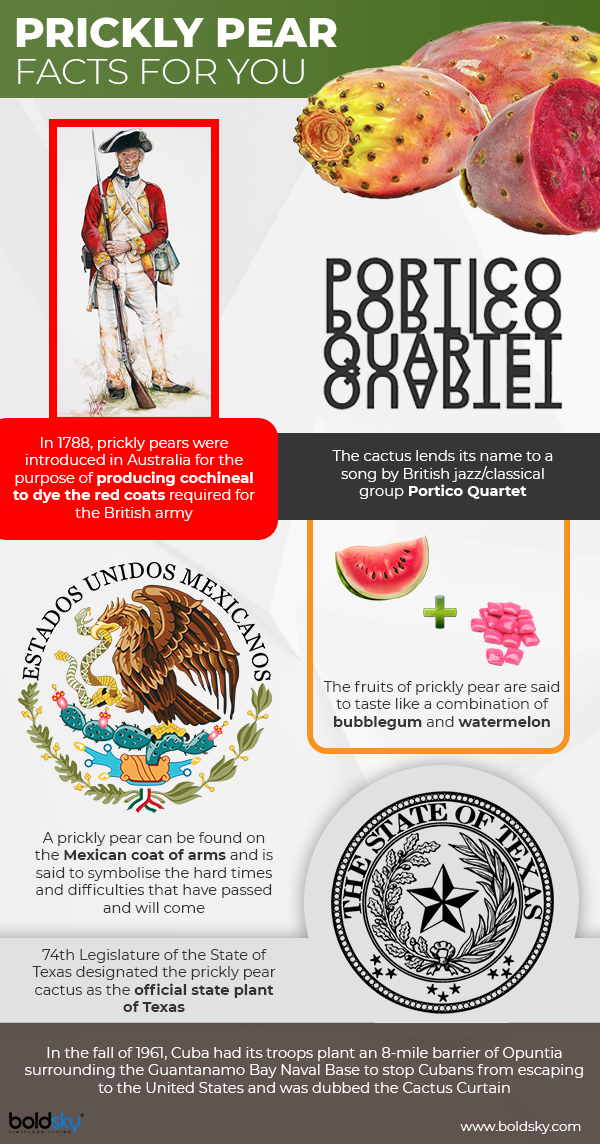
9. Protects the liver
Packed with plenty of antioxidants, prickly pears or opuntia can help prevent liver damage. The antioxidants aid you by reducing the oxidative stress caused by toxins and unwanted particles in your body. It also helps by eliminating the free radicals that could attack your liver[11] .
10. Prevents ulcers
The compound called betanin in opuntia help reduce the levels of pro-inflammatory chemicals found in your body, which are the causal factors of ulcers. Consuming prickly pears can be beneficial in preventing the onset of ulcers as it helps regulate the gastric mucus production as well.
Healthy Opuntia Recipes
1. Prickly pear juice
Ingredients[12]
- 3 prickly pears
- 1 cup of water
- ½ cup orange juice, freshly squeezed
Directions
- Slice both ends of the prickly pear off.
- Peel back the skin, by pushing it back with a knife or your hand.
- Place peeled prickly pears in a blender with 1 cup of water.
- Blend at the lowest speed for 1 minute.
- Strain and discard the seeds and pulp.
- Pour the prickly pear juice back in the blender, with orange juice.
- Blend until smooth.
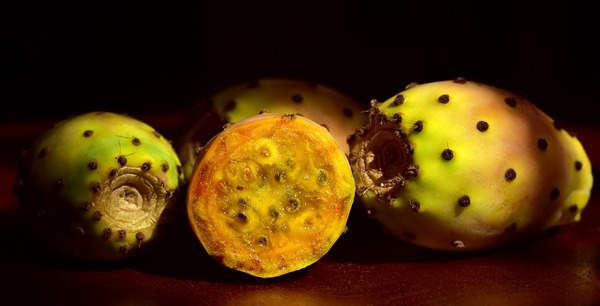
2. Prickly pear, orange and mint salad
Ingredients
- 2 prickly pears, wedged
- 1 orange, wedged
- 1 tablespoon fresh mint, chopped loosely
- ½ teaspoon honey
Directions
- Cut pears and oranges into wedges.
- Add the mint to it.
- Toss the ingredients together in a medium-sized bowl.
Side Effects Of Opuntia
- It can cause upset stomach, diarrhoea, bloating, and headache in some cases.
- In some individuals, it can cause allergic reactions resulting in nasal inflammation or asthma [13] .
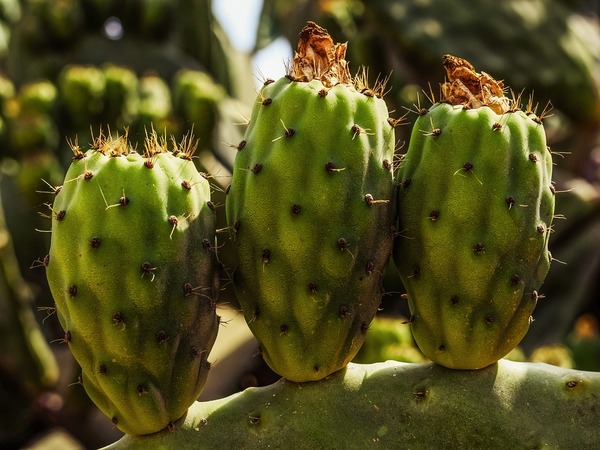
- It may interfere with your body's ability to absorb certain medications due to the diuretic property.
- Pregnant or women who are breastfeeding should avoid consuming the fruit as it can with the foetus development.
- Always remove the peel of the pear before consumption [14] .
- [1] Livrea, M. A., & Tesoriere, L. (2006). Health benefits and bioactive components of the fruits from Opuntia ficus-indica [L.] Mill.Journal of the Professional Association for cactus Development,8(1), 73-90.
- [2] del Socorro Santos Díaz, M., Barba de la Rosa, A. P., Héliès-Toussaint, C., Guéraud, F., & Nègre-Salvayre, A. (2017). Opuntia spp.: characterization and benefits in chronic diseases.Oxidative medicine and cellular longevity,2017.
- [3] Cieślik, E., Cieślik, I., & Bartyzel, K. (2016). The nutritional value and health benefits of fig prickly pear (Opuntia ficus-indica Mill.).Postępy Fitoterapii.
- [4] Ciriminna, R., Delisi, R., Albanese, L., Meneguzzo, F., & Pagliaro, M. (2017). Opuntia ficus‐indica seed oil: Biorefinery and bioeconomy aspects.European Journal of Lipid Science and Technology,119(8), 1700013.
- [5] Shackleton, R. T., Witt, A. B., Piroris, F. M., & van Wilgen, B. W. (2017). Distribution and socio-ecological impacts of the invasive alien cactus Opuntia stricta in eastern Africa.Biological Invasions,19(8), 2427-2441.
- [6] Ness, J. H., & Holway, D. A. (2017). 14 Mutualisms and the Reciprocal Benefits of Comparing Systems.Ant-Plant Interactions: Impacts of Humans on Terrestrial Ecosystems, 290.
- [7] Silva, M. A., Albuquerque, T. G., Pereira, P., Ramalho, R., & Costa, H. S. (2018). Nutritional characterization and biological activity of Opuntia ficus-indica (L.) Mill. fruit. In3rd International Congress of CiiEM-2018, 20-22 junho 2018. Instituto Nacional de Saúde Doutor Ricardo Jorge, IP.
- [8] Otun, K. O., Yekeen, T. A., & Ajibola, T. A. (2016). Phytonutrient Contents of Opuntia ficus indica L. Stem grown in Nigeria.
- [9] Cano, M. P., Gómez-Maqueo, A., García-Cayuela, T., & Welti-Chanes, J. (2017). Characterization of carotenoid profile of Spanish Sanguinos and Verdal prickly pear (Opuntia ficus-indica, spp.) tissues.Food chemistry,237, 612-622.
- [10] Belviranlı, B., Al‐Juhaimi, F., Özcan, M. M., Ghafoor, K., Babiker, E. E., & Alsawmahi, O. N. (2019). Effect of location on some physico‐chemical properties of prickly pear (Opuntia ficus‐indica L.) fruit and seeds.Journal of Food Processing and Preservation, e13896.
- [11] González-Stuart, A. E., & Rivera, J. O. (2019). Nutritional and Therapeutic Applications of Prickly Pear Cacti. InBioactive Food as Dietary Interventions for Diabetes(pp. 349-360). Academic Press.
- [12] Gentilesco, J. (n.d). Prickly Pear recipes [Blog post]. Retrieved from, https://thelatinkitchen.com/r/recipe/prickly-pear-orange-and-mint-salad
- [13] El Aalaoui, M., Bouharroud, R., Sbaghi, M., El Bouhssini, M., Hilali, L., & Dari, K. (2019). Comparative toxicity of different chemical and biological insecticides against the scale insect Dactylopius opuntiae and their side effects on the predator Cryptolaemus montrouzieri.Archives of Phytopathology and Plant Protection, 1-15.
- [14] Partovi, N., Ebadzadeh, M. R., Fatemi, S. J., & Khaksari, M. (2018). Antilithiatic effect of aqueous and ethanolic extracts of cactus prickly pear in chemically induced urolithiasis in rats.Toxin Reviews,37(2), 166-170.
-
 recipesSpecial Cactus Recipe: How To Prepare Indian Style Cactus Fry
recipesSpecial Cactus Recipe: How To Prepare Indian Style Cactus Fry -
 skin careHow To Add Cactus To Your Skin Care Routine
skin careHow To Add Cactus To Your Skin Care Routine -
 nutritionBenefits Of Eating Cactus Leaf
nutritionBenefits Of Eating Cactus Leaf -
 gardeningWater Purification Now With Cactus
gardeningWater Purification Now With Cactus -
 wellness10 Seasonal Fruits To Include In Your Diet
wellness10 Seasonal Fruits To Include In Your Diet -
 nutrition10 Amazing Nutrition Facts About Pears
nutrition10 Amazing Nutrition Facts About Pears -
 nutrition20 Fibre-rich Indian Foods For Weight Loss
nutrition20 Fibre-rich Indian Foods For Weight Loss -
 basicsIs It Safe To Eat Pears During Pregnancy
basicsIs It Safe To Eat Pears During Pregnancy -
 nutritionThis Is Why You Should Eat Pears Everyday !
nutritionThis Is Why You Should Eat Pears Everyday ! -
 healthAmul’s New Protein Product For Gym-Goers And Vegetarians: Know More About ‘Super Milk’
healthAmul’s New Protein Product For Gym-Goers And Vegetarians: Know More About ‘Super Milk’ -
 wellnessHeadache After Drinking Red Wine? This May Be The Reason!
wellnessHeadache After Drinking Red Wine? This May Be The Reason! -
 healthRelieve Day-to-Day Stress Like Shilpa Shetty With A Tennis Ball!
healthRelieve Day-to-Day Stress Like Shilpa Shetty With A Tennis Ball!


 Click it and Unblock the Notifications
Click it and Unblock the Notifications



